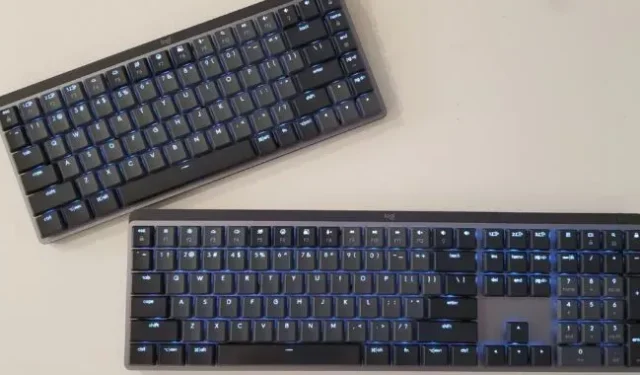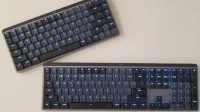| Specifications Brief: Logitech MX Keys Mechanical | |
|---|---|
| Switches | Kailh low profile tactile, click or linear |
| Keycaps | ABS plastic |
| Connection options | Bluetooth low energy or 2.4GHz USB-A dongle |
| Backlight | White |
| Size | 17.08 x 5.18 x 1.03 inches (433.85 x 131.55 x 26.1 mm) |
| Weight | 1.35 lb (612 g) |
| Guarantee | 1 year |
| Price (suggested retail price) | $170 |
The Logitech MX Keys Mechanical Wireless Keyboard (MSRP $170) with office-friendly looks, stylish backlighting, wireless multi-PC control and simple software was announced Tuesday, as well as the smaller MX Keys Mini ($150), are reliable and convenient entry points to mechanical keyboards.
If the new keyboards look familiar, it’s because they’re inspired by the look and feel of the MX Keys ($120) and MX Keys Mini ($100) wireless membrane keys, respectively, but with satisfying low-profile clicky, tactile, or linear mechanical switches.. . It is this kind of design that makes many people try a mechanical keyboard for the first time. But when you compare it to other wireless mechanical keyboards, you can find more features, including some that power users will miss, from the competition for less money.
Keeping a discreet profile
I tend to be wary of low profile mechanical keyboards. Some of the poor quality choices I’ve tried with small, soft, linear low-profile switches and flat keycaps have scared me a bit. They are popular with gamers for their supposed speed advantage, but you have to be competitive enough (I’m not) for that to make a huge difference.
But with slightly more height than other low-profile options and higher actuation force specifications, the switches in the MX Keys proved to be a good compromise. They still acted quickly like laptop keyboards, while still providing healthy movement for those accustomed to full-sized mechanical switches.
You can get MX Keys Mechanical with what Logitech told me are proprietary tactile, clicky, or linear switches made by Kailh. All three types have a total travel of 3.2mm, actuate at 1.3mm, and require 55g of force to actuate. The travel characteristics of the switches make them similar to the Kailh Choc range of low profile switches, but require more actuation force (compared to 45g).
I mainly used the tactile version of the keyboard and it was far from soft. Compared to the full size Cherry MX Brown switch (4mm/2mm/55g), the brown MX Keys Mechanical switches are quicker to actuate and return, likely due to the shorter travel.
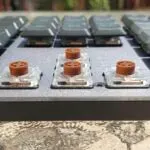
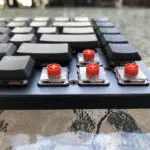
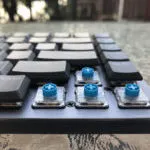
At the same time, they retained the noticeable bulge that tactile switches are known for. The low-profile switches were noticeably shorter than the full-size alternative, they felt fairly snappy when typing quickly, but I still felt like I had a comfortable amount of travel to know I was hitting every key. And the higher actuation force helped me avoid typos.
There are even low-profile switches, like the $250 Logitech G915 Lightspeed Wireless Keyboard (2.7mm/1.5mm/50g). When compared against the G915 with tactile switches, the MX Keys Mechanical were noticeably shorter, but the tactile protrusion was slightly less noticeable. The MX Keys Mechanical tactile keys sounded about as loud as other Brown switch keyboards, with a slight, higher-pitched noise when I hit the tactile bump and a more plastic sound when the key returned.
I spent far less time with the linear and clicky versions of the keyboard, but was pleasantly surprised by how deep the linear switches feel despite the short travel and lack of tactile punch; although there are smoother linear switches. The clicky switches, meanwhile, were just as loud and proud as I’d hoped for Blue mechanical switches.
I sometimes heard an annoying metallic ringing when typing aggressively, especially with a space. The rival Razer Pro Type Ultra Wireless Keyboard (MSRP $160) combats this with sound-absorbing foam, but it only comes with linear switches.
